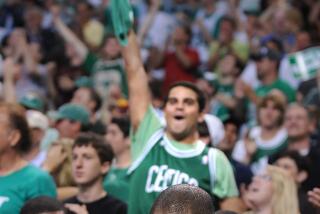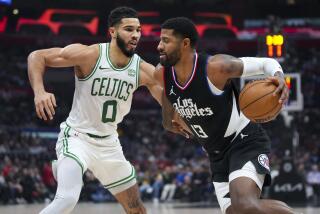Instigator or Retaliator? : Celtics’ Ainge Has Learned to Live With ‘Cheap Shot Artist’ Label
- Share via
BOSTON — If reputation means anything, Danny Ainge of the Boston Celtics should have gotten 10 rebounds in an NBA playoff game long before his team’s 128-96 rout of the Milwaukee Bucks in Game 1 of the Eastern Conference final.
But that’s one of the paradoxes that surrounds Ainge, 27, whose angelic face can contort into something hellish at the drop of a hat--or, more likely, at the toot of a referee’s whistle.
By nature, rebounding is nasty business, complete with shoves, pushes and not-so-gentle elbowing. Yet, it’s considered an honorable pursuit. Just part of the game.
Grabbing a player rushing toward the basket for a layup isn’t honorable. Neither are flagrant elbows, midcourt pileups that more resemble rugby scrums than basketball and the gnawing of fingers during altercations.
One way or another, Ainge has been involved in each of those scenarios and more during his five seasons with Boston. The question is, to paraphrase one of Celtics President Red Auerbach’s credos, is he the instigator or the retaliator?
The answer, said Ainge, doesn’t matter. “It’s something that I’ve learned to deal with. People call me a cheap-shot artist or a dirty player. It doesn’t bother me anymore, even though I don’t think it’s accurate. Once you’re labeled in this league, you’re labeled. I don’t know what you can do to change it.”
Ainge also has bolstered his reputation as a skilled basketball player this season, particularly in the playoffs. He followed his team-leading 10-rebound performance Tuesday with 10-for-12 shooting in the Celtics’ second-game victory Thursday night.
Ainge led Boston in assists 22 times during the regular season. He’s also playing determined defense, running the fast break with discipline and driving to the basket. In Boston’s first 10 playoff games, Ainge surpassed his regular-season averages of 10.7 points and 2.9 rebounds per game with 15.6 points and 4.7 rebounds.
The origin of Ainge’s cheap-shot reputation lies in two incidents during the 1983 playoffs. In the first, he tackled Atlanta center Tree Rollins after being hit in the jaw with an elbow. During the subsequent melee, Rollins bit one of Ainge’s fingers, opening a wound that required five stitches to close.
Less than two weeks later, in the conference semifinals against the Bucks, Milwaukee Coach Don Nelson called Ainge “a dangerous player,” one bent on intentionally harming the members of his team. Thus, a legend was born.
“Before that, I’d never had any problems with anyone. It didn’t affect me at first, but then things started snowballing,” said Ainge. “Nelson said those things one night after I’d gotten 25 points in the first half against them. If I’d had my normal six- to eight-point game, it wouldn’t have ever come up. The thing with Tree still bothers me; nine out of 10 people still think that I was the one who bit him, not the other way around.”
If that’s the case, it’s a perception reinforced by the constant sight of Ainge grabbing opposing players in the open court or grimacing like Peck’s bad boy when a call doesn’t go his way.
“People say I cry a lot on the court,” he said. “Yeah, I make expressions when I miss shots. I’m emotional, very much into the game. I react to everything, but I see Magic Johnson, Kareem (Abdul-Jabbar), Isiah (Thomas) and Charles Barkley do those things, too. But I guess if you’re not a superstar you’re not allowed to act like that.”
Not if you’re a non-superstar who looks as if he leads a perfect life, one in which it appears that every little thing has been handed to you on a silver platter. Such is the case with Ainge, a three-sport high school star who went to Brigham Young, where he was an all-America in basketball and played baseball with the Toronto Blue Jays during the summer.
Upon graduation from BYU, Ainge decided that the baseball lifestyle was preferable to that offered by the NBA and joined the Blue Jays full-time. After a couple of sub-.200 seasons at the plate, the decision didn’t look as good to him. When the Celtics drafted him in the second round of the NBA draft, it looked even worse.
Ainge tried to bail out of his baseball contract and sign with the Celtics. The Blue Jays balked and wouldn’t release him. After a long and sometimes bitter court battle, Boston paid the baseball team $500,000 for the rights to him.
There are those who believe Ainge’s problems really began then. After all, how many coal miners decide they no longer like soot and grime and are allowed to change their profession?
“With basketball, Danny was going into an area where he still had some knowledge or expertise,” said teammate Dennis Johnson. “But that didn’t matter to a lot of people. People just don’t enjoy someone invading upon another’s territory and that’s how they looked upon Danny. I think he had to act feistier just to protect himself.”
Johnson, who was once reportedly described as “a cancer” by Seattle Coach Lenny Wilkens during his time with the SuperSonics, is familiar with reputations. Shortly after he joined Phoenix, Johnson came to be regarded as moody and selfish.
“Then I join the Celtics and suddenly all that just seemed to disappear like magic,” he said. “That’s just as false as the original reputation was. Danny’s already here, so I don’t know what he does. I know that he should be man enough to accept the good with the bad.”
Nelson now says Ainge no longer does the things that caused him to judge him so harshly three years ago. Ainge responds that the damage has been done and that all he can do is attempt to limit the cost.
“The (opposing team’s) fans are still gonna boo and call me names. That’s their prerogative. What I do is try to use it to my advantage, to motivate me. I’d heard so much about how the fans in Atlanta were going to yell and curse at me when we went down there (during the semifinals), I got all psyched up for them, and they were actually good. Frankly, I was disappointed.”
More to Read
Go beyond the scoreboard
Get the latest on L.A.'s teams in the daily Sports Report newsletter.
You may occasionally receive promotional content from the Los Angeles Times.










